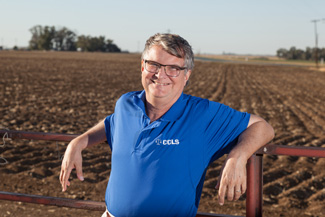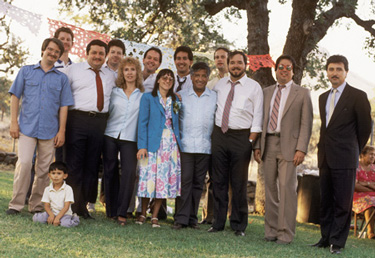Tending the shepherds: Fresno attorney lauded for
commitment to legal services
By Psyche Pascual
Staff Writer
Chris Schneider drove warily as he passed a lonely stretch
of Highway 99 in Kern County. It was 1989, and he’d spent many late nights
searching for shepherds, eyes peeled for the telltale beacon of an oil lamp.
 |
Chris Schneider made a career in legal services after standing up for the rights of sheep herders in the Central Valley.
Photo by S. Todd Rogers |
After hours peering into the darkness, Schneider finally spotted
a dim glow near an alfalfa field at Panama Lane. There he found a young
Peruvian sitting near a dusty 10-by-5 foot trailer without air conditioning, running
water, a phone, a car or even a toilet. His only source of water – a 50-gallon
tank – was caked with algae. Despite the hour, the shepherd was still tending
his flock.
“I remember this young man being in tears about the
conditions he found himself in,” Schneider said. Many were paid well below
minimum wage, and many never had a day off. He worked when the heat soared into
the triple digits, and from 4 a.m. until late at night, Schneider recalled.
The shepherd was terrified he’d be caught talking to a stranger. If so, he knew
he’d be fired, abandoned at an airport or a rundown motel, Schneider said.
“It was the way the growers would have total control over
their workers’ lives,” he said.
This shepherd’s tale was one of many documented in “Suffering
in the Pastures of Plenty: Experiences of H-2A Sheepherders in California’s
Central Valley,” a groundbreaking report Schneider co-authored in 2000 that
exposed the hardscrabble life of immigrant shepherds. That report led to a new
state law the next year aimed at raising wages and providing better working
conditions.
 |
Chris Schneider, far left, celebrates with United Farm Workers founder César Chavez, center, and other participants of the UFW legal apprenticeship program.
Photo by Victor Alemán/2mun-dos.com |
Today, the 59-year-old executive director of the Central
California Legal Services (CCLS) in Fresno has gone beyond documenting the
lives of immigrant shepherds. Schneider has built a career out of providing
legal services to immigrant and poor communities.
It’s why Schneider has won one of the State Bar’s highest
honors, the Loren Miller Legal Services Award, which he’ll receive on Oct. 9 in
Anaheim during the bar’s Annual Meeting.
Schneider stands out in another way: He lacks a college or law
school degree. His on-the-job training came during a stint with the United Farm
Workers in the days of co-founder César Chavez.
Michael Kanz, an administrative law judge with the state
Department of Social Services, said Schneider’s early work with farm workers was
invaluable in understanding his clients’ problems first hand.
In the case of the shepherds, “these are people you rarely
ever see because they’re way out in remote areas living in tents and trucks and
not visible from the highway,” said Kanz, who co-authored the 2000 report with
Schneider. Schneider “would go out and find them. And ultimately through years
of research, he was successful in advocating for sea changes.”
Schneider’s interest in immigrants’ struggles was sparked
during his time at a Catholic elementary school in Indianapolis. One day, a
priest from Delano, gave a lecture about the UFW grape boycott.
Schneider went home told his mother not to buy grapes again.
A self-described “college dropout,” Schneider was only 17
when he came to California to volunteer for the UFW in 1973. He’d promised his
father he would attend one year of college in Indiana, but in 1974 he rejoined
the union to work in Chicago. Schneider came back to California in 1977.
“Seeing how the power structure came down against the farm
workers, seeing the kids in the fields, seeing the teamsters terrorizing
strikers, seeing the sacrifices workers were making convinced me I would stay
on,” he said.
When Ellen Eggers, Schneider’s supervising attorney at the
UFW who also came to California from Indiana, first met Schneider, they were
working in a rough part of Los Angeles. One day, he walked down the block to
the laundromat to wash his clothes and got mugged at knifepoint.
“They stole his watch that he got for graduation” from high
school, Eggers recalls. “But he was undaunted. That was his early introduction
to Los Angeles.”
As a skinny youth at La Paz, the UFW headquarters in Keene, Schneider’s irrepressible sense of humor and energy stood out to many
who knew him. “He was very joyful. Always laughing,” said Gil Padilla, a UFW
organizer. “You couldn’t help but like him.”
Eventually the UFW put Schneider in charge of the staff
organizing boycotts in 17 cities, a job that took him as far south as Calexico
and across the San Joaquin Valley.
It was César Chavez who recruited Schneider to join the
UFW’s then-fledgling legal apprenticeship program. “ ‘What did your old man
tell you years ago?’ ”Schneider recalled his
father saying when he told him about the program. “He meant that I should have
listened to him years ago when he told me I should become an attorney.”
That on-the-job training was grueling. During the day, Schneider
worked as a paralegal representing the union before hearings with the Agricultural
Labor Relations Board. Often he was pitted against attorneys armed with decades
of experience and a staff of paralegals.
“I took a whupping a number of times,” Schneider said with a
smile, “but I also won a number of times.”
At night and on the road, Schneider would read law books and
listen to cassette tapes of Eggers’ lectures in his car. To this day, every
time he drives on a stretch of Highway 101 near Paso Robles, Schneider remembers
a lecture on perpetuities because “that’s where I learned it.”
The schedule took its toll. Schneider failed the First Year
Law Students’ Examination the first time around, so he took it again and passed.
Then in 1986, at the age of 29, Schneider took and passed the California Bar Examination
on his first try, he said.
Today, Schneider is associated with many positive changes up
and down the San Joaquin Valley. A flyer on his wall marks a series of community
meetings in 1995 that resulted in getting a badly needed shopping center into
west Fresno. Schneider has also pushed for workshops to help low-income tax
filers get little-known tax credits, said Juan Arambula, a former California assemblyman
and attorney in Fresno.
Many know Schneider through legal activism, but many also note
he has a creative side that expresses itself in photos. He’s often seen at
cultural festivals around Fresno toting his Nikon camera. “His passions are his
work, his family and photography,” Arambula said.
Schneider’s leadership at Central California Legal Services
has also set a younger generation of attorneys on the path to representing poor
clients. Over and over, Ana de Alba, a partner with Lang Richart & Patch in
Fresno, marveled at how Schneider pursued and patched together resources to
keep services afloat.
Just a few months ago, Schneider helped cobble together
enough funding to create a new online legal service connecting attorneys and
clients in Merced and Fresno over the Internet, de Alba said. That approach was
important for far-flung communities, where finding an affordable lawyer nearby is
often out of reach.
“Here in the rural communities, you can’t just jump on a bus
to get there. You’d have to take three or four buses. And what if you had three
kids?” de Alba said. Schneider “really believes that justice should be for
everyone. He’s made it his life’s mission to do that.”
Approachable and deferential even to younger attorneys, Schneider
has tried to keep those around him interested in law in the face of a dismal
job market. He inspired former CCLS board president William E. McComas of
Fresno to become an attorney, writing letters for McComas’ application to UC
Davis School of Law.
When McComas found law school difficult, he thought of Schneider’s
training. “If this man could pass the bar without going to law school, without
having the structured program, without the bar prep, not being in a learning
environment that’s conducive to study, without a library, without the study groups,
then I knew I could do it,” he said.
Those who know Schneider say he puts his agency before
himself. When CCLS researched the best place to house a team staffing a legal
advice hotline, it found Schneider’s corner office was the best suited because
of its many phone jacks. Schneider let the team take it over.
Recently Schneider announced his retirement from CCLS, an agency
he’s worked at and headed for more 22 years. Although Schneider hasn’t
announced what he will do after leaving at the end of the year, he says his
legal activism will continue.
In fact, he may delve into work that first got him noticed:
documenting the bleak living conditions of shepherds in California – this time to
see if they have improved. Schneider’s research is already being duplicated in
states such as Colorado, Montana and Washington, where shepherds work under
similar harsh conditions.
“There have been some improvements, but I just feel we have
so far to go yet,” Schneider said. “I imagine I will still have something to do
in this area.”